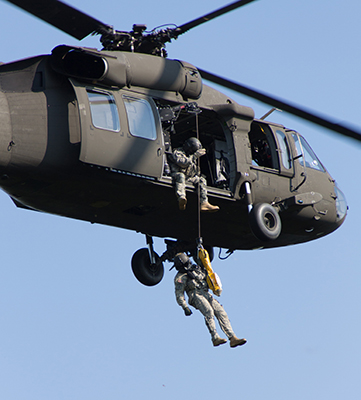
Photo by SPC Harley Jelis, HHC 42nd CAB, NYARNG
(Cicero, NY- July 19, 2015) New York Army National Guard helicopter crews and four UH-60 Blackhawk helicopters conducted hoist rescue training with local sheriff and fire departments on Oneida Lake in the vicinity of Frenchman Island yesterday, Saturday July 18.
The helicopter crews and sheriff and local fire departments exercised a scenario in which a fire department rescue boat retrives a victim in the water and calls for assistance from a National Guard helicopter.
The helicopter crew lowers a medic into the boat. That medic stabilizes the patient and the aircrew hoists the patient and medic back onto the hovering helicopter.
The aviation soldiers, assigned to Company F, 1st Battalion 169th General Support Aviation Battalion also conducted helicopter operations familiarization training and helicopter landing zone layout training for members of seven local volunteer fire departments.
The U.S. Coast Guard Auxiliary, the Oswego County Dive Team, and marine patrol deputies from the Onondaga, Oswego, and Madison County sheriff departments were on hand to participate in the training.
The joint training allows the Rochester-based Army National Guard aviators and local first responders to gain experience working with each other as they would during a joint response to weather or other emergency situation. This kind of training is critical to ensuring that both military and civilian agencies work well together when lives are at risk.
The West Monroe Volunteer Fire Department was the lead civilian agency for this joint training. Other volunteer fire department’s participating were:
- Brewerton Volunteer Fire Department ;
- Caughdenoy Volunteer Fire Department;
- Cleveland Volunteer Fire Department;
- Central Square Volunteer Fire Department ;
- Constantia Volunteer Fire Department;
- North Bay Ambulance;
- Oswego County Dive Team;
- And the South Bay Volunteer Fire Department.
The civilian first responders were taught how to properly “hot load” a Blackhawk medical evacuation helicopter and how to help military personnel select landing zones which helicopters can use in an emergency.
Civilian medivac helicopters normally shut down their engines when loading patients. Army medivac helicopter crews train to load patients with the helicopter rotors turning.
Each Army National Guard helicopter is crewed by four or five Soldiers, a pilot and co-pilot, one or two highly trained flight medics, and a crew-chief.
Operating above water can be very demanding for helicopter pilots who must maintain their location during a hover without the landmarks they normally use when operating over ground. The training provides the helicopter crews the opportunity to hone the skills needed to operate in a maritime environment.
Company F is an air ambulance unit which flies UH-60 helicopters configured with a rescue hoist and which can carry patients in litters. The unit is based at Army Aviation Support Facility #2 at the Rochester International Airport. Unit members are currently conducting their annual training at Fort Drum.
The company deployed to Afghanistan from November 2012 to August 2013. During their 10-month deployment, unit Soldiers conducted 471 missions during which they transported 527 American, coalition and Afghan soldiers or civilians.
The flight medics assigned to Company F were the first to provide blood infusions in flight to wounded Soldiers and civilians in the region. Previous to the unit’s deployment, blood products were only used at larger bases.
This lifesaving measure ensured multiple badly injured civilians and coalition partners arrived at the next level of care alive. This procedure was nicknamed “Vampire” and the unit completed more than 40 “Vampire” missions in flight. The unit responded to six mass casualty incidents, one totaling 83 patients.

